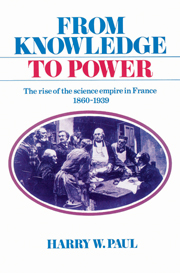Book contents
- Frontmatter
- Contents
- Acknowledgments
- Introduction: From dream to dream in laying the foundations
- 1 From Second Empire to Third Republic: the great scientific mutation
- 2 Fata morgana: positivism in nineteenth-century French biology
- 3 Biology in the University: the success of marine biology leads but to paradigm lost
- 4 The industrial connection of University science
- 5 Science in agriculture: an increasing role in the new land of plenty
- 6 Science in the Catholic universities
- 7 Scientific publication: the flood of monographs, books, and journals unleashed by the new research imperative in schools and societies
- 8 Science funding in the twentieth century: laying the foundations of the science empire
- 9 The denouement of the 1930s: a new scientific function for the state
- Notes
- Bibliography
- Index
Introduction: From dream to dream in laying the foundations
Published online by Cambridge University Press: 11 September 2009
- Frontmatter
- Contents
- Acknowledgments
- Introduction: From dream to dream in laying the foundations
- 1 From Second Empire to Third Republic: the great scientific mutation
- 2 Fata morgana: positivism in nineteenth-century French biology
- 3 Biology in the University: the success of marine biology leads but to paradigm lost
- 4 The industrial connection of University science
- 5 Science in agriculture: an increasing role in the new land of plenty
- 6 Science in the Catholic universities
- 7 Scientific publication: the flood of monographs, books, and journals unleashed by the new research imperative in schools and societies
- 8 Science funding in the twentieth century: laying the foundations of the science empire
- 9 The denouement of the 1930s: a new scientific function for the state
- Notes
- Bibliography
- Index
Summary
L'histoire est un “roman vrai.”
– Paul VeyneIn his Histoire de la civilisation en Europe (Sorbonne lectures, 1828–30), François Guizot showed without difficulty that French civilization was the truest representative of European culture. That this judgment was a truism for cultured men of the day was evident in John Stuart Mill's ready assent that only a clod could not know that “the history of civilization in France is that of civilization in Europe.” What was the nature of this civilization that enthralled the European mind for at least two centuries? The superb German survey entitled The Civilization of France (1930) by Ernst Curtius makes it mainly a matter of literary culture: “Literature plays a far larger part in the cultural and national consciousness of France than it does in that of any other nation.” Victor Hugo summed it up: “Literature is civilization.” Curtius argued that “in France literature fulfills the function which among us [Germans] is divided between philosophy, science, poetry and music.” So even Cartesianism, “the most important factor in the intellectual history of France,” was distilled into the literary cliché of clarté française. France's intellectual hegemony in Europe was facilitated by the cultural universality of its language, characterized by “logic, lucidity, brilliance, naturalness, and taste.” This leaves little room for the cult of Isis, widely touted elsewhere as the goddess to whom we must pay tribute for our modernity.
Information
- Type
- Chapter
- Information
- From Knowledge to PowerThe Rise of the Science Empire in France, 1860–1939, pp. 1 - 14Publisher: Cambridge University PressPrint publication year: 1985
